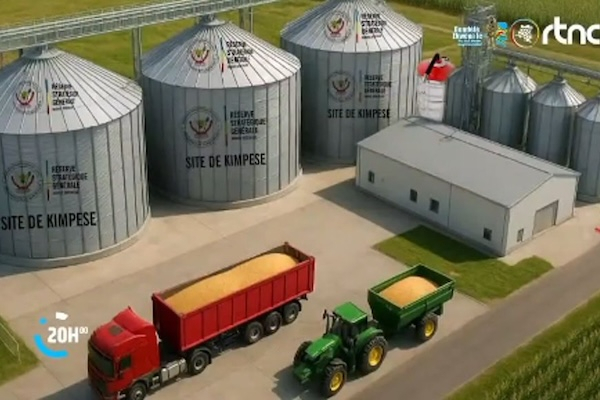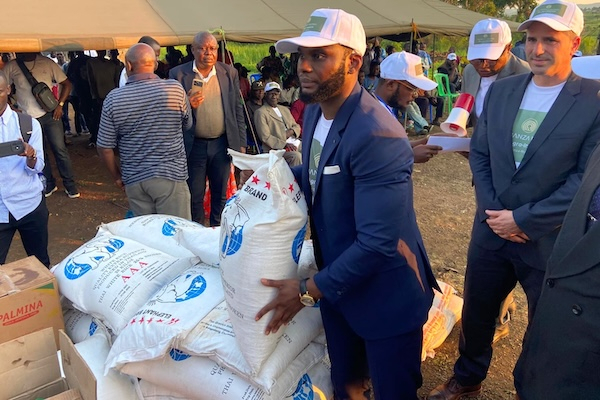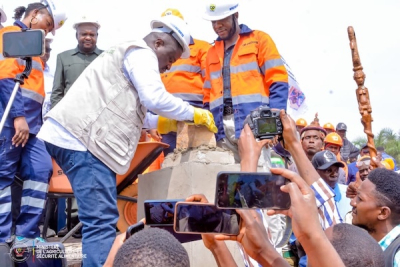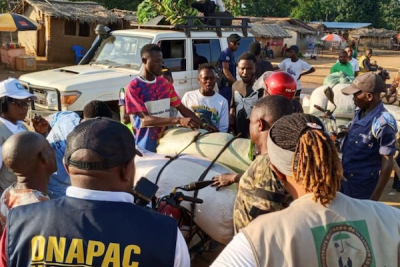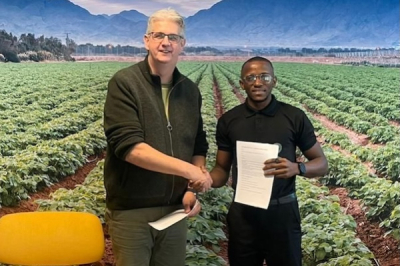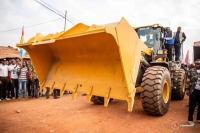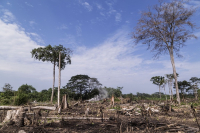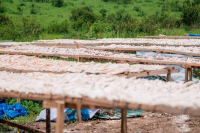
AGRICULTURE (32)
The Democratic Republic of Congo (DRC) plans to develop a nationwide network of grain silos through its General Strategic Reserve (RSG). Under the 2026-2028 Public Investment Plan, the government intends to allocate 14.5 billion Congolese francs, equivalent to about $6.6 million at the average exchange rate, for the construction of these facilities.
Serge Mulumba Katchy, the coordinator of the presidency-linked institution, announced that a pilot project will be set up in Kimpese, in Kongo Central province. In November 2025, he travelled to Italy to meet with the supplier producing the equipment for this first site. He said the Kimpese project would have a minimum capacity of 5,000 tonnes of grain and that the same model would later be rolled out in the country’s other provinces.
This preparatory work followed a working session held in October 2025 with experts from U.S. consulting firm International Reliable Consulting (IRC). According to the RSG, the discussions explored potential cooperation on the implementation of the silos and the establishment of a seed bank.
Created by presidential decree, the General Strategic Reserve is tasked with preventing and managing crises by building strategic stocks of essential goods. It aims to support food security, stabilise prices and assist local producers by building and renewing reserves that can be mobilised in the event of a crisis, shortage or natural disaster.
In September 2025, the institution intervened in the maize market in Kinshasa, offering 25-kg bags of maize flour for sale at 35,000 Congolese francs. This was significantly lower than prices in the capital at the time, which ranged between 40,000 and 63,000 francs depending on quality. The operation, carried out in several markets across the city, aimed to ease pressure on households and stabilise prices during a period of market strain.
Timothée Manoke
The Swiss group Mole, which specializes in agricultural commodity trading, launched a preparatory phase on Dec. 11, 2025, to secure land for the construction of the Mbanza-Ngungu agro-industrial park in Kongo Central. The project spans more than 105,000 hectares, including 85,000 hectares of arable land, and represents an estimated investment of $1 billion.
For the developers, land acquisition is the most sensitive stage of the project. Although the Democratic Republic of Congo has more than 80 million hectares of arable land, less than 10% of which is currently exploited, access to land remains one of the main constraints on agro-industrial development. Key challenges include an unreliable land registry, customary and community disputes, legal inconsistencies, risks of land grabbing, lengthy and costly procedures, and weak institutional governance.
A launch meeting attended by customary authorities, civil society representatives, and technical and financial partners was held to inform local communities, particularly land rights holders, about the process. During the meeting, the Swiss group sought to reassure stakeholders. “No land will be used without the approval of its owner,” a company representative said.
Rights holders will be asked to sign a letter of commitment defining a non-binding framework for cooperation. The document authorizes technical studies, mapping, and land inventories, while guaranteeing communities the right to retain control over land-use decisions until a final sales contract is signed. The process also includes the establishment of a grievance management committee, negotiations on acquisition terms, and the eventual signing of a contract.
Mole Group has also committed to relocating people currently living on the site to new residential areas, integrating them into partner agricultural cooperatives, and granting them priority access to employment opportunities. “The aim is to ensure that everyone is fairly compensated and can benefit from the project’s returns,” said CEO Gandi Mole.
Under the public-private partnership agreement signed last October with the Ministry of Agriculture, land constitutes part of the state’s contribution to the project. “But to avoid any conflict, we wanted to proceed differently by involving local communities from the outset,” a source within the Swiss company said. The developers aim to secure 80% of the required land within six to eight months, a move intended to facilitate the government’s role in the process.
Once fully operational, the agro-industrial park is expected to produce 700,000 tonnes of finished products annually, including cassava, maize, and wheat flours, as well as sugar and rice. The project is projected to generate more than 20,000 direct and indirect jobs.
In addition to state support, the project is backed by international partners, notably Switzerland-based Bühler, which specializes in agri-food equipment and advanced materials, and Belgium’s De Smet Engineers & Contractors, known for its expertise in delivering turnkey agro-industrial plants.
Ronsard Luabeya
The African Development Bank (AfDB) on Dec. 8 approved $160 million in financing to improve transport and logistics links around the Ngandajika Agro-Industrial Park (PAIN) in Lomami province, in the Democratic Republic of Congo.
The project’s total cost is estimated at $177.16 million, with the Congolese government covering the balance. Construction work was officially launched on Dec. 2 by Minister of State for Agriculture Muhindo Nzangi.
According to the AfDB, the project aims to reduce the isolation of the PAIN area and better integrate it into the central DRC’s main economic corridors. It includes the construction and rehabilitation of the Nkuadi-Ngandajika-PAIN and Lukalaba-Ngandajika road corridors, as well as upgrades to connecting roads between the RN1 and RN2 national highways. The plan also includes an extension of the runway at Mbuji-Mayi airport to support agri-business freight operations.
The investments are expected to benefit farmers, transport operators and agri-businesses in Kasaï-Oriental and Lomami by lowering logistics costs and improving access to markets. Women and young people, who play a key role in local agricultural value chains, are also expected to gain from the expanded economic opportunities.
Léandre Bassolé, the AfDB’s Director General for Central Africa, said the financing marks “a major step forward for Central Africa’s economic integration and for the industrialization of agriculture in the DRC.” He added that the project is not limited to road infrastructure but is designed to strengthen agricultural value chains and develop new trade corridors, boosting competitiveness and economic inclusion.
The project is part of the Agricultural Transformation Program (PTA) and complements the Support Program for the Development of the Ngandajika Special Agro-Industrial Processing Zone (PRODAN).
In October, the agriculture ministry launched a tender to recruit contractors for several design-and-build components of the PAIN. These include site development, construction of internal roads, connection to the high- and medium-voltage power grid, installation of drinking water systems, deployment of internal fibre-optic networks, and construction of a one-stop service centre and an agricultural aggregation and services hub.
Ronsard Luabeya
Congolese agricultural authorities on Tuesday began seizing unfermented cocoa beans in the Mambasa territory of Ituri province, local media reported.
The operation, carried out by the Office National des Produits Agricoles (ONAPAC), aims to stop practices that are hurting cocoa quality in the region. The decision follows resolutions adopted at the second general assembly of coffee and cocoa farmers held in October.
ONAPAC will be assisted by the Local Council for Coffee, Cocoa, and Other Agricultural Products for Rural Development, the anti-fraud unit of the Congolese National Police, and the Mambasa Peace Court to enforce the regulations.
Other measures will also take effect, local media said. These include a formal ban on roaming, informal buying practices to combat fraud, curb unfair competition, and improve traceability. Buyer identification will also be required to secure transactions and strengthen accountability in the supply chain.
The measures come amid a sharp drop in cocoa prices in October. Local media reported that the price per kilogram fell from 20,000 Congolese francs to 6,000 francs in several buying houses in Mambasa and Irumu.
While global prices have been affected by a production recovery in West Africa, part of the local collapse is due to quality issues. Dieudonne Kambale, an agronomist with ESCO Kivu, quoted by 7sur7.cd, said the region’s cocoa suffers from insufficient fermentation. Although beans should ferment for about a week, many producers dry them directly in the sun for only two to three days before selling.
The head of the local buyers’ association for agricultural and perennial products, Mumbere Musumba Jackson, made the same point in July.
Timothée Manoke
The Ministry of Agriculture launched a Steering Committee (COPIL) on November 7, 2025, to oversee two agricultural projects in Songololo, Kongo Central province, with a combined budget of $32 million. Implemented by the One Ancre Fund and initiated in December 2024 and June 2025, respectively, the projects had not yet entered their operational phase. According to Ministry Secretary-General Damas Mamba, the creation of the committee marks the formal start of implementation.
The COPIL is tasked with supervising and coordinating project execution. Its responsibilities include approving annual work plans and budgets, validating progress and financial reports, and reviewing recommendations from project monitoring committees. The committee will also address operational challenges, assess institutional arrangements, and approve any necessary budget adjustments in line with the procedures of the Central African Forest Initiative (CAFI) and the National REDD+ Fund (FONAREDD).
The first project, titled “Smallholder Deforestation-Free Agriculture,” is financed by CAFI with $2 million for an 11-month period. Officially launched on December 22, 2024, it seeks to encourage smallholders to adopt sustainable farming practices, particularly by moving away from slash-and-burn cultivation in forested areas.
The second project, “Supply of Inputs and Stabilization of Smallholder Agriculture,” benefits from $30 million in FONAREDD funding over three years. Launched on June 30, 2025, it aims to improve smallholder productivity and promote more stable and sustainable agricultural practices in the region.
Both initiatives focus on three core objectives: distributing certified local seeds to increase yields, promoting the “farmer-entrepreneur” model to support the creation of rural microenterprises, and introducing Payments for Environmental Services (PES) to reward sustainable farming and reforestation.
Ronsard Luabeya
Frico Agri, a Congolese company that produces frozen fries from locally grown potatoes, has signed three memorandums of understanding (MoUs) with Dutch firms, Delphy B.V., Go&Grow Farm Solutions, and Agrico B.V., to support the growth of the potato industry in the Democratic Republic of Congo (DRC).
The partnerships were formalized during a business visit to the Netherlands from October 13 to 30, 2025, led by Frico Agri founder Jean Johnson Bapanga. The mission received technical support from the Netherlands Enterprise Agency (RVO), the Dutch Embassy in the DRC, the Orange Corners program, and Ingenious City.
The planned collaboration with Delphy B.V. will focus on adapting agricultural practices to local growing conditions. The firm will offer expertise in sustainable soil management, integrated pest control, climate-smart farming, and technical training for local producers.
Go&Grow Farm Solutions will help Frico Agri modernize its operations by strengthening mechanization, upgrading storage facilities, and training local staff.
The proposed agreement with Agrico B.V. covers a 10-hectare pilot project to grow the Markies potato variety in Kongo Central province. The project includes varietal trials, producer training, and agronomic monitoring to improve yields and quality. Frico Agri expects the pilot to produce around 450 tons of potatoes per year, enough to keep its processing plant supplied between harvests.
Founded in 2019, Frico Agri has a monthly capacity of 20.8 tons of frozen fries, processing about 41.6 tons of potatoes. Internal reports show that since 2024, the company has faced two major bottlenecks: a shortage of high-quality seed potatoes for industrial processing and inadequate storage facilities. These challenges are linked to limited specialized potato cultivation and a lack of local expertise in varietal selection and post-harvest handling.
Frico Agri hopes to overcome these obstacles through the planned partnerships, though the signing dates and implementation timeline have yet to be announced.
Ronsard Luabeya
Grace Nkuanga Bilolo, governor of Kongo-Central province in the Democratic Republic of Congo, launched a road rehabilitation project on Oct. 25, 2025, aimed at improving the transport of farm goods to markets.
The project, which began in Kinzau Nvuete in Seke-Banza territory, covers 550 kilometers of rural feeder roads. The work will be carried out in stages, with the first phase focusing on 230 kilometers of priority routes over nine months.
The first phase, financed by the Agency for the Management of Toll and Weighing Rights (AGDP), will cost 3.85 billion Congolese francs (about $1.6 million), or roughly $7,000 per kilometer.
The launch phase includes the Kinzau-Mvuete, Seke-Banza, Mbatassiala, and Lombo-Fuese-Kilukweta sections, located in the Kasangulu and Mbanza-Ngungu territories. The Kongo-Central Public Works Agency will carry out the work.
Governor Bilolo unveiled new civil engineering equipment purchased with provincial funds to support the project. He said the initiative is part of a provincial program to better connect rural areas, aiming to ease the sale of farm produce and improve living standards in local communities.
The governor’s announcement follows a statement by former Rural Development Minister Muhindo Nzangi Butondo in October 2024, outlining a government plan to build and rehabilitate 11,000 kilometers of agricultural feeder roads across the DRC. It was not immediately clear whether the Kongo-Central project is part of that national initiative.
Ronsard Luabeya
Swiss agricultural commodity trader Mole Group signed a Public-Private Partnership (PPP) with the Democratic Republic of Congo (DRC) on Sept. 30, 2025, for a vast agro-industrial project in Mbanza-Ngungu, Kongo Central province. The contract was signed by Mole Group Director General Grandi Mole and Agriculture Minister Muhindo Nzangi Butondo.
The agreement, expected for about one year now, is expected to complete the project’s structuring phase. Partners include Swiss firm Bühler, a specialist in agro-industrial machinery, and Belgian company De Smet Engineers & Contractors, known for turnkey plant construction. International financiers are also expected to join.
Mole said that secondary studies, to be carried out with the United Nations Industrial Development Organization (UNIDO), will begin in October 2025. Construction is scheduled to start in the third quarter of 2026 and will take four years.
The project covers more than 105,000 hectares, including 85,000 cultivable, and will require about $1 billion in investment. Plans call for an agro-industrial park with modern infrastructure: communication towers, hangars, warehouses, silos, processing plants, and administrative offices. It will also include schools and phytosanitary laboratories.
Annual production targets stand at 650,000 tons of food products: 70,000 tons of wheat flour, 150,000 tons of sugar, 150,000 tons of corn flour, 20,000 tons of rice, and 260,000 tons of cassava flour. Local raw materials such as cassava, maize, wheat, rice, and sugarcane will be transformed into flour, refined sugar and ethanol.
Mole Group expects the initiative to generate more than 20,000 direct and indirect jobs, stimulating the rural economy. If achieved, it would mark a step toward reducing the DRC’s chronic food deficit and dependence on imports. According to the Central Bank of Congo, food imports cost the country nearly $1.79 billion annually between 2019 and 2023.
Ronsard Luabeya
Highlights:
• DRC launches $19M climate resilience project targeting 30,000 people in eastern provinces
• Global Environment Facility contributes $8.24M for sustainable agriculture on 15,000 hectares
• Initiative focuses on North Kivu, South Kivu, and Maniema with emphasis on women and youth entrepreneurship
The Democratic Republic of Congo (DRC) is rolling out a five-year climate adaptation program targeting its eastern regions. The $19 million "Resilient Growth and Adaptation to Climate Change" project aims to strengthen climate resilience in provinces plagued by both environmental degradation and ongoing conflict.
The Global Environment Facility's Least Developed Countries Fund is providing $8.24 million of the total budget, with the DRC government and other partners covering the remainder. The initiative will focus on North Kivu, South Kivu, and Maniema—three provinces with fragile forest ecosystems and high vulnerability to climate impacts.
The program plans to reach around 30,000 people, with women making up half the beneficiaries. It will prioritize agricultural resilience and community support, including assistance for indigenous peoples and Pygmy communities often marginalized in development programs.
Key activities include deploying sustainable farming practices across 15,000 hectares through improved seed distribution and training over 500 lead farmers. The training aims to help farmers cope with climate threats like droughts, floods, and unpredictable rainfall patterns that increasingly disrupt harvests.
Special attention will go to female and youth entrepreneurship through technical and financial support for agricultural processing and marketing ventures. This approach targets both immediate climate adaptation and longer-term economic opportunities in regions where alternatives to subsistence farming remain scarce.
The project aligns with the DRC's National Adaptation Plan and commitments under the Paris Agreement. Officials say it addresses root causes of vulnerability, including ecosystem breakdown, weak institutions, and limited economic prospects.
Success will depend heavily on security conditions in the eastern provinces, where armed groups continue to disrupt rural communities and development efforts.
Boaz Kabeya
Highlights:
• The FAO will help the DRC develop cassava into an industrial sector, especially for flour production.
• The partnership follows a high-level intercontinental forum co-hosted by Vietnam and the FAO in July 2025.
• Congolese authorities are urged to show clear budgetary and political commitment to integrate cassava into national economic planning.
The United Nations’ Food and Agriculture Organization (FAO) will help the Democratic Republic of Congo (DRC) industrialize cassava production to help boost employment and reduce hunger and poverty in the country. The announcement was made by the DRC’s Minister of Agriculture, Grégoire Mutshail Mutomb, according to Agence congolaise de presse (ACP).
The decision comes on the heels of the first edition of the High-Level Inter-regional Knowledge Exchange on One Country One Priority Product (OCOP) Models forum, co-organized by the FAO and the government of Vietnam from July 15 to 17, 2025, in Hanoi. Ministers of agriculture from 17 African and Asian countries attended the event, including the DRC.
According to Minister Mutshail, the FAO's support will focus primarily on developing cassava processing into bread flour, which can be blended with wheat flour to make bread. The specific terms of the cooperation have not yet been finalized. “We will have more meetings in the coming months. If all goes well, the next meeting could be held right here in the DRC,” the Congolese official noted.
The initiative adds momentum to existing efforts to industrialize the cassava sector and generate greater local value. In April 2023, the Congolese government adopted a plan to substitute 20% of wheat flour with cassava flour in bread-making, and to use 100% cassava flour in pastries, waffles, and pizzas. The move aimed to reduce the country’s wheat import bill—valued at $87 million per year—and rely less on imports from Russia and Ukraine.
However, progress remains uneven. A World Bank report published in September 2023 pointed to significant structural challenges that continue to weigh down the cassava value chain. These include excessive bureaucracy, high taxation, limited access to credit and land, and poor infrastructure, particularly in electricity and transportation.
In light of these challenges, Minister Mutshail emphasized the need for a strong budgetary commitment and political will from national authorities.
This article was initially published in French by Stéphanas Assocle
Edited in English by Ola Schad Akinocho
More...
DRC’s Minister of External Trade Julien Paluku Kahongya announced that several Congolese agricultural products, including coffee and cocoa, will now enter the UK market duty-free. This decision follows a June 17, 2025 meeting with Kumar Iyer, the UK ambassador to the United Nations, the World Trade Organization (WTO), and other international organizations in Geneva.
"Certification and compliance bodies will oversee the implementation of this decision," Paluku Kahongya said. DRC exporters looking to ship agricultural goods to the UK must register with the Rural Payments Agency to get an import license. For fruits and vegetables, a certificate of conformity from UK authorities is also required. London stated that these procedures can be completed online.
This news comes amid a significant drop in DRC’s exports to the UK. Data from the International Trade Centre (ITC) shows that the value of goods imported from the DRC by the UK fell from $261.6 million in 2022 to just $12 million in 2024, a 95.4% decrease. No official reason has been provided for this decline.
In February, the Ministry of External Trade and the UK embassy in Kinshasa established a technical commission to speed up the signing of trade agreements aimed at boosting exports. Local media reported that discussions focused on a list of 62 priority products, though this list has not been made public.
The UK government noted that it introduced a preferential trade scheme for developing countries, including the DRC, in 2023. This scheme is part of its post-Brexit trade policy and offers reduced tariffs on 99% of goods from these nations, aiming to lower raw material import costs for British businesses.
This article was initially published in French by Timothée Manoke (Intern)
Edited in English by Mouka Mezonlin
Armed fighters from the M23 rebel group looted the Lemera tea factory in South Kivu’s Kalehe territory on June 6, in the latest blow to the region’s fragile agricultural economy. Backed by the Rwandan army, the group reportedly stole all production equipment, including agricultural and industrial machinery, according to Radio Okapi. The factory has since suspended all operations.
The Lemera plant, a remnant of the colonial era, had served as a key economic driver in the Kalehe and Kabare-Kabamba areas. It processed raw tea leaves for both domestic consumption and export, supporting nearly 100 families and offering stable income to smallholder growers. The factory also maintained specialized equipment for plantation upkeep—now lost to looting.
The shutdown adds to a broader crisis plaguing the tea industry in both North and South Kivu, where persistent insecurity has halted production at several facilities. In North Kivu, the once-thriving Ngeri Tea Gardens (JTN), spanning 450 hectares, are now abandoned. The site, which used to produce around 240 tonnes of tea annually, has also ceased operations due to repeated conflict-related disruptions.
This collapse comes at a critical moment for the Democratic Republic of Congo, which risks missing out on a projected boom in demand for eco-friendly tea. A 2024 report by the International Institute for Sustainable Development (IISD) forecasts that U.S. and European demand for sustainably grown tea will rise by 8.4% and 6.6%, respectively, by 2026.
The DRC produced roughly 2,000 tonnes of tea in 2020, placing it 11th among African producers, according to the latest FAO data. However, without urgent measures to restore stability in its key agricultural zones, the country’s tea sector may be unable to seize this growing export opportunity.
This article was initially produced in French by Ronsard Luabeya, (intern)
Edited in English by Ola Schad Akinocho
At the May 30, 2025 Council of Ministers meeting, the government of the Democratic Republic of Congo (DRC) reviewed a note from Portfolio Minister, Jean Lucien Bussa, regarding the resumption of activities at Triomf RDC SA, a mixed-economy company that manufactures chemical fertilizers.
According to meeting minutes, Bussa emphasized the need to secure adequate financing for investment, working capital, and cash flow to ensure a reliable supply chain and sustainable business relaunch. The Ministry of Agriculture and Food Security is currently studying these financing options.
Triomf RDC was established in October 2013 through a public-private partnership between the Congolese state (30% stake) and South African company Africom Commodities Ltd (70%). The goal was to produce fertilizers locally to support the Congolese agricultural sector. The plant, located in Boma, Kongo Central province, was inaugurated in April 2017. When fully operational, it had an annual production capacity of 25,000 tonnes and employed around 2,000 people, with initial investments totaling US$50 million.
Despite a promising start, Triomf RDC faced challenges that led the firm to cease operations. A 2021 assessment by the Fonds de promotion de l'industrie (FPI) revealed a lack of funds to purchase essential inputs, forcing the company to produce fertilizers abroad for the Congolese market. The FPI recommended recapitalizing the investment to revitalize the project.
The Congolese government has since taken steps to relaunch Triomf’s activities. At the July 14, 2023 Council of Ministers meeting, President Félix Tshisekedi directed the Portfolio Minister to collaborate with other government members to develop a revival plan. In September 2024, Minister Bussa discussed the possibility of increasing the company's capital and amending its articles of association with a company delegation.
This article was initially published in French by Boaz Kabeya (intern)
Edited in English by Ola Schad Akinocho
Producers and intermediaries in North Kivu’s cocoa sector are increasingly turning to Uganda to sell their products through informal channels, seeking to optimize their marketing strategies.
On May 19, 2025, at least five tons of cocoa (118 bags) were intercepted by the sub-section of the Office national des produits agricoles du Congo (ONAPAC) in Beni, within the Ruwenzori sector (Beni territory). According to authorities, the cargo was being illegally exported to Uganda. This seizure forms part of ongoing efforts to combat fraud in the cocoa sector.
Commenting on the seizure, Kaswera Syvialeghana Alphonsine, Director of ONAPAC in Beni, said such operations aim to discourage illicit trafficking of cocoa, and coffee, in the region.
For several months, sector players have denounced numerous obstacles hindering official marketing channels and encouraging smuggling to neighboring countries. They highlight persistent insecurity in production zones, poor condition of farm roads, proliferation of roadblocks, high transportation costs, and the lack of product traceability in the DRC. These constraints, according to local exporters, hamper cocoa transport through formal channels and push many operators to turn to Uganda.
Congolese cocoa production is primarily concentrated in the eastern provinces, notably North Kivu, Ituri, and Tshopo. However, these regions are often attacked by armed groups–a situation that compromises producer security and severely disrupts the supply chain.
According to data from the Ministry of Foreign Trade, the DRC produced 100,000 tonnes of cocoa in 2024, far from the ambitious target of 3 million tonnes set for 2030.
This article was initially published in French by Ronsard Luabeya (intern)
Edited in English by Ola Schad Akinocho






